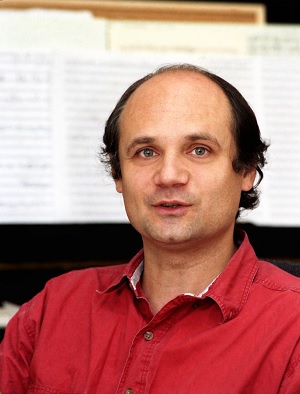The journey of musical works from author to performer
The task of the music publisher is to put manuscripts (be they paper or computerised) into a form that is legible, inspiring, and easy to use for performers; and to ensure the promotion, distribution, and legal use of the works.
With 75 years of experience behind us, we do this honourable work with consideration, commitment, and enthusiasm.
We thank the composers and music teachers who entrust their works to us.
Csapó, Gyula
 His music grew out of the minimalism of the 1970-s, to which his early analytical minimalism, drone systems and timbral sensitivity responded by giving it a new dimension. Early exposure to the music of Cage, Feldman, Kurtág, Boulez, Stockhausen and Xenakis and the Budapest New Music Studio merely strengthened his pursuit of his own unmistakable path in works quintessentially Csapó without ever a reminiscence or a repeat. His career led him from Hungary through Paris to New York and Canada, and this trajectory endowed him with a truly global musical outlook that he carefully and consciously cultivates. His music, once heard, is impossible to forget due to its often timeless beauty, referencing multiple traditions while being exceptionally innovative; finding a voice for the general and the highly individual alike, and creating unique narratives and dramaturgies that embrace and mesmerize its listeners worldwide.
His music grew out of the minimalism of the 1970-s, to which his early analytical minimalism, drone systems and timbral sensitivity responded by giving it a new dimension. Early exposure to the music of Cage, Feldman, Kurtág, Boulez, Stockhausen and Xenakis and the Budapest New Music Studio merely strengthened his pursuit of his own unmistakable path in works quintessentially Csapó without ever a reminiscence or a repeat. His career led him from Hungary through Paris to New York and Canada, and this trajectory endowed him with a truly global musical outlook that he carefully and consciously cultivates. His music, once heard, is impossible to forget due to its often timeless beauty, referencing multiple traditions while being exceptionally innovative; finding a voice for the general and the highly individual alike, and creating unique narratives and dramaturgies that embrace and mesmerize its listeners worldwide.
Short biography1955 Born in Pápa, Hungary, lives in Saskatoon, Canada 1979 Joined the New Music Studio Budapest 1981 Graduated in Composition and Music Theory at the Ferenc Liszt Academy of Music Received a French Government Scholarship to pursue studies in musical acoustics and computer music at IRCAM, Paris 1983–87 Woodburn Fellowship (1983–87) to study with Morton Feldman in the United States. At the recommendation of John Cage, he was twice awarded grants from the Foundation for Contemporary Performance Arts in New York City 1990 Performance of Handshake After Shot by the Continuum Ensemble at Lincoln Center in New York. Invited to teach at McGill University in Montreal 1991–94 Assistant Professor of Composition at Princeton University Since 1994 Professor at the University of Saskatchewan in Saskatoon, Department of Composition and Music Theory 1996–97 Fellow of Collegium Budapest – Institute for Advanced Study, continued working on his Phaedra, a “tragedy in music“, based on Jean Racine's Classic 1998 Modern Quartet of Toronto, Canada premiered his works in Ottawa, Berlin, Paris and Stuttgart 2001 Premiere of Straight Labyrinth performed by Gábor Csalog at Huddersfield Contemporary Music Festival 2008 Premiere of Concerto for Viola and a Changing Environment performed by Rivka Golani, and the Hungarian Radio Symphony Orchestra, conducted by László Tihanyi at Budapest Autumn Festival 2009 ARTISJUS Prize for Concerto for Viola and a Changing Environment, voted The Classical Music Composition of the Year 2009 2016 Fellow of the Széchenyi Academy of Letters and Arts (founded by the
|
Selected worksThe Last Tape. Hommage à Samuel Beckett (1975) for a violinist-actor and two assistants, a tape-recorder, a sine-wave generator, a stage with curtain and four spotlights, dur. 26 min. Handshake after Shot (1977) for two muted tpt, ob, electric organ and suspended cardboard box, dur. 3 min. Hark, Edward … – Homage to Edvard Grieg (1979, rev.1997) for two cimbaloms, piano and double‑bass, dur. 20 min. Phèdre – Tragédie/parodie en musique in five acts to the libretto by the composer Хρόνοι [Khrónoi] – In memoriam Morton Feldman (1988, rev. 92) for string quartet, dur. 18 min. A Desert March … (1993) for piano, dur. 40 min. Sutræcitations to text fragments from the Avatamsaka Sutra (Flower Ornament Scriptures) in the English translation by Thomas Cleary (1995) for Soprano or Tenor and four players: 3 cl, pf, amplifier, loudspeaker; (1996) for Mezzosoprano or Bariton and four players, dur. ca. 25 min. The Straight Labyrinth – Le sacre de tous-les-temps (2001) for piano, dur. 15 min. Phrag Mental Friezes (2001) for cl (bcl), vln, vc, pf and three woodblocks (one player), dur. 22 min. Tundragobelin – Finnegan’s Dreams to the memory of James Joyce (2002) for cl, vln, vc and pf, dur. 20 min. Talea Iacta Est (2008) for orchestra, dur. 20 min. Concerto for Viola and a Changing Environment (2004–2009) for viola and orchestra, dur. 30 min. Parmi les Blancs et Noirs…at Intervals…from the Cabin (2008) for fl (afl, bfl), cl (bcl), French hn, perc, pf, vln, vc, dur. 21 min. |
 Deutsch
Deutsch English
English Español
Español Français
Français Magyar
Magyar Polski
Polski Română
Română Slovenský
Slovenský 中文
中文







